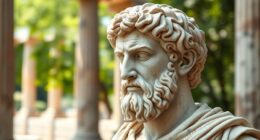Stoic philosophers include Zeno of Citium, who founded the philosophy in Greece, along with Roman thinkers like Seneca, Epictetus, and Marcus Aurelius. Zeno emphasized living in harmony with nature and reason, while Seneca focused on resilience and virtue in daily life. Epictetus taught acceptance of external events, and Marcus Aurelius reflected on inner strength in his famous meditations. If you explore further, you’ll discover how their ideas still influence personal resilience and ethical living today.
Key Takeaways
- The primary Stoic philosophers include Zeno of Citium, Seneca, Epictetus, and Marcus Aurelius.
- Zeno founded Stoic philosophy in the early 3rd century BCE in Athens.
- Roman Stoics like Seneca, Epictetus, and Marcus Aurelius adapted and expanded Stoic ideas.
- These philosophers emphasized virtue, rationality, self-control, and acceptance of external events.
- Their teachings focus on cultivating inner resilience and living in harmony with nature and reason.
The Origins of Stoicism in Ancient Greece
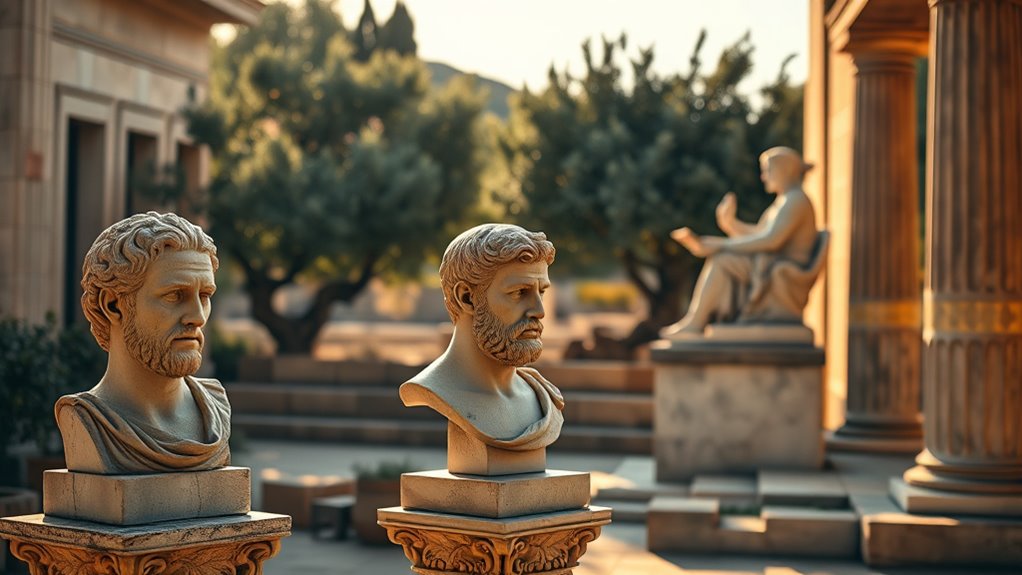
Stoicism began in ancient Greece during the early 3rd century BCE, emerging as a response to the chaos and uncertainty of the Hellenistic period. During this time, Greece faced political upheaval, wars, and shifting philosophies, which made people seek stability and inner peace. You’re likely to find that the founder, Zeno of Citium, started teaching in Athens, emphasizing self-control, rationality, and virtue. He believed that by mastering your desires and emotions, you could live in harmony with the natural order. The philosophy spread quickly, influencing many thinkers who built upon its ideas. As you explore Stoicism, you’ll see it rooted in the Greek desire for resilience and clarity amid tumult, laying the groundwork for a practical approach to living well. The emphasis on emotional regulation and understanding the natural world remains central to Stoic practices today. Additionally, the development of ethical principles helped Stoicism appeal to those seeking a comprehensive guide for personal conduct. Understanding the foundational concepts of Stoicism can deepen your appreciation for its enduring relevance and practical wisdom. Furthermore, modern concerns about AI vulnerabilities highlight the importance of resilient and adaptable philosophies like Stoicism in navigating complex challenges. Recognizing that Stoicism promotes mental resilience can provide valuable tools for overcoming personal and societal difficulties.
Socrates and the Foundations of Ethical Thought
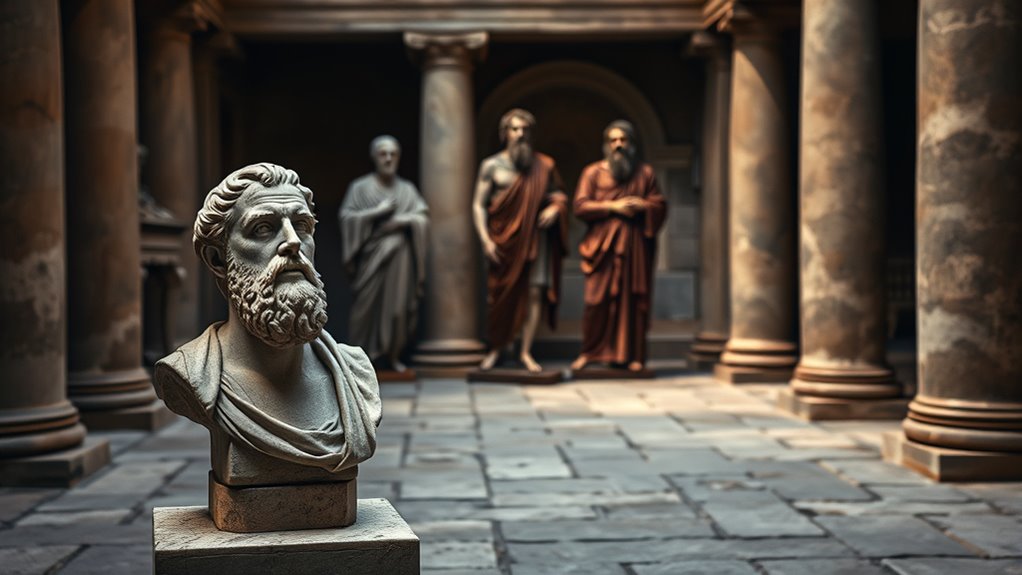
Socrates consistently challenged his students to think critically about what it means to live a good life. He believed that ethical understanding wasn’t handed down but discovered through questioning and dialogue. By asking probing questions, he encouraged others to examine their beliefs and values, emphasizing that knowledge and virtue are interconnected. Socrates argued that knowing what’s right leads to doing what’s right, laying a foundation for moral responsibility. His focus on self-awareness and integrity influenced the development of ethical thought, shifting the emphasis from external rules to internal virtues. Through his method of dialectic, he aimed to uncover universal truths about justice, virtue, and the good life, setting the stage for future philosophical explorations into ethics and moral character. Additionally, his emphasis on self-awareness and moral responsibility helped shape the way subsequent philosophers approached ethical inquiry. Socrates’ approach underscored the importance of internal virtues, which continue to underpin modern discussions of ethics and moral development. His belief in the importance of reflective thinking for ethical growth remains a vital aspect of philosophical discourse today. Recognizing that ethical inquiry is an ongoing process, Socrates encouraged continuous questioning and learning as essential to moral progress. Moreover, his recognition of the Lifespan perspective highlighted the importance of ongoing moral and psychological growth throughout life.
Zeno of Citium and the Birth of Stoic Philosophy
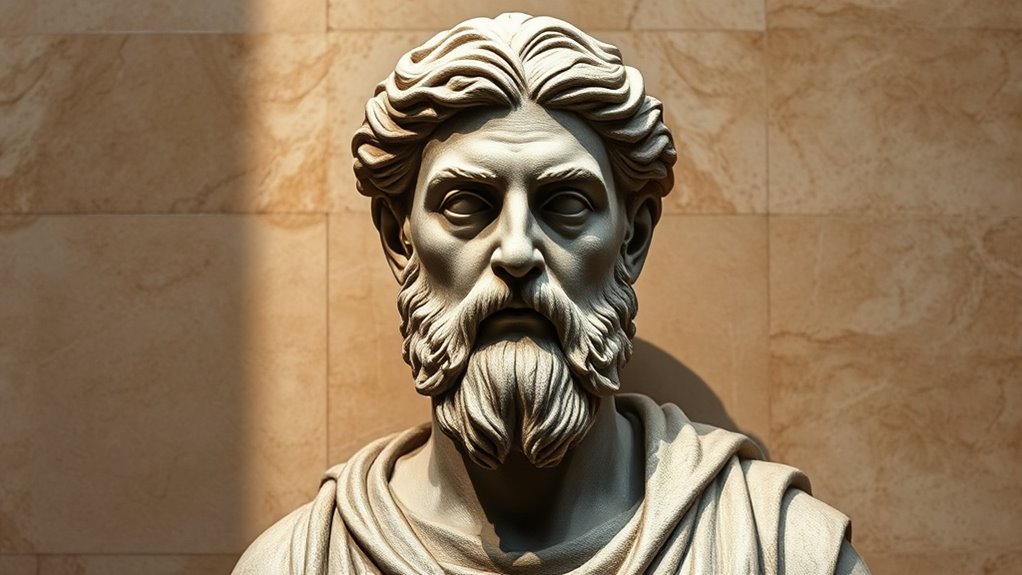
Zeno of Citium, a Phoenician merchant turned philosopher, founded what would become known as Stoic philosophy around the early 3rd century BCE. After surviving a shipwreck, you might say he turned to philosophy seeking stability and purpose.
He traveled to Athens and studied under various schools before developing his own ideas. Zeno taught that living in harmony with nature and reason leads to true happiness. He emphasized self-control, virtue, and resilience against life’s hardships.
His teachings focused on accepting what you can’t change and cultivating inner strength. Zeno’s ideas laid the foundation for Stoicism, a practical philosophy aimed at helping you navigate life’s challenges with wisdom and calmness.
His influence shaped a movement that would endure for centuries.
The Roman Stoics: Seneca and Epictetus
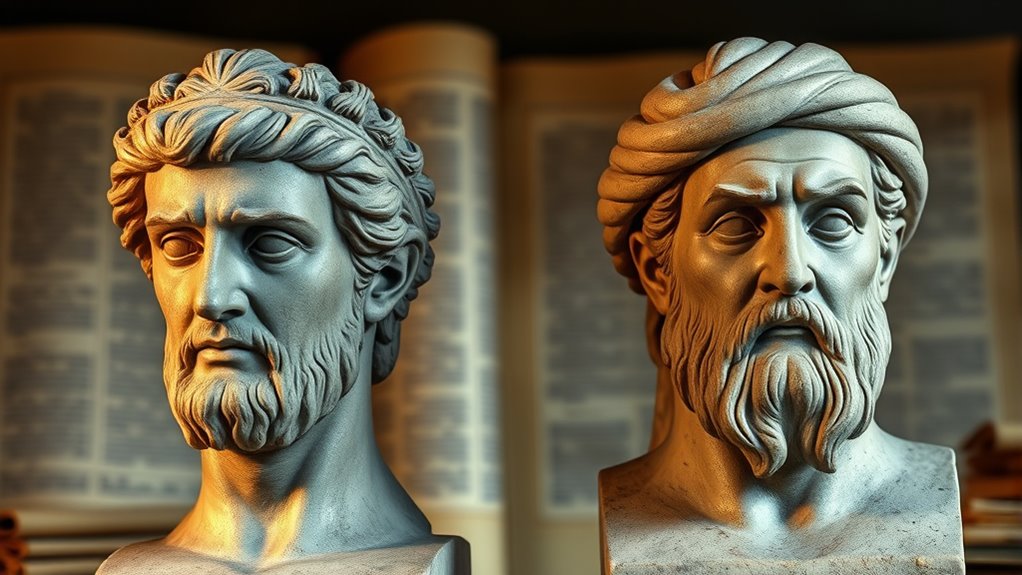
After Zeno’s foundational ideas took root in Greece, Roman thinkers adapted and expanded Stoic philosophy to fit their own lives and society. Seneca, a statesman and adviser, showed you how to face life’s challenges with resilience and virtue. His letters and essays emphasize controlling your emotions and focusing on what you can change. Incorporating effective sound design techniques can enhance the emotional impact of these teachings, making them more relatable in modern contexts. Epictetus, a former slave turned teacher, teaches you to accept what’s outside your control and to cultivate inner strength. His teachings, recorded by his student Arrian, focus on discipline, self-awareness, and living according to nature. Both philosophers stress that your happiness depends on your mindset, not external events. Their ideas help you develop mental resilience, accept life’s hardships, and live morally, making Stoicism practical for everyday life. Recognizing the importance of mental resilience enables you to better apply Stoic principles in various situations and maintain inner peace amidst external chaos. Understanding philosophical adaptation reveals how these ancient teachings remain relevant today and can be integrated into contemporary self-improvement practices. Additionally, their emphasis on virtue ethics underscores the importance of moral character in achieving true happiness.
Marcus Aurelius: The Philosopher-King’s Reflections
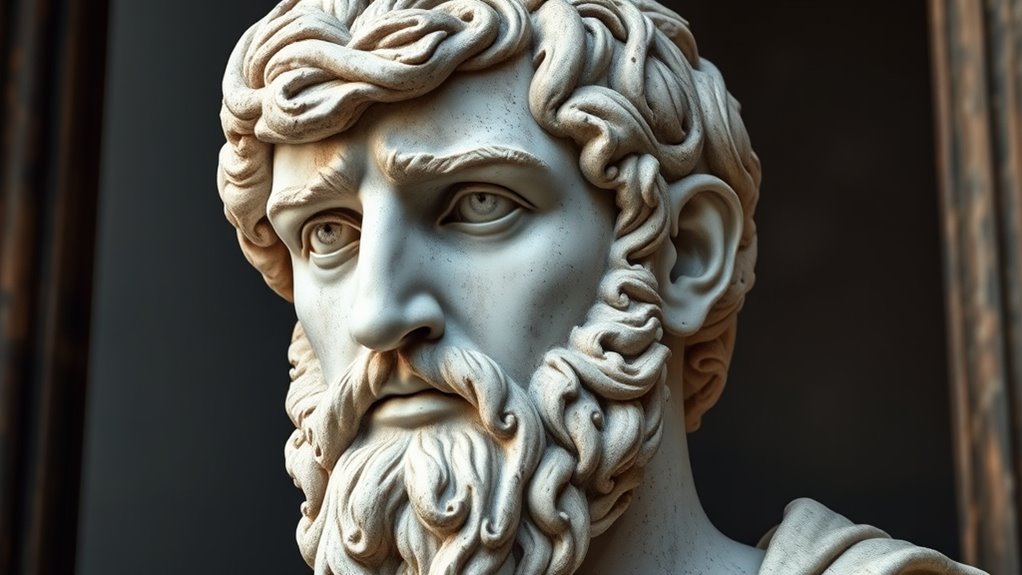
Marcus Aurelius, the Roman emperor renowned for his wisdom, practiced Stoic philosophy amidst the responsibilities of ruling an empire. His writings, compiled in *Meditations*, reveal a deep commitment to self-improvement and inner resilience. You’ll see how he sought to maintain equanimity despite external chaos, emphasizing virtues like discipline, humility, and rationality. His reflections serve as a guide for managing emotions and embracing mortality. Moreover, he believed in cultivating inner tranquility, which was central to Stoic practice and helped him navigate the complexities of leadership and personal life. – Emphasized the importance of inner tranquility over external circumstances – Advocated for acceptance of fate and the transient nature of life – Practiced self-awareness and critical reflection regularly – Recognized the value of community and shared human rationality – Demonstrated leadership rooted in virtue rather than power
Key Ideas and Teachings of Stoic Thinkers

As a Stoic, you learn that virtue is the highest goal, guiding your actions and choices. You’re encouraged to focus on what you can control and accept what you cannot. Embracing these ideas helps you find peace regardless of external circumstances. Practicing Stoic virtues provides a framework for living with integrity and purpose in everyday life. Additionally, understanding the role of hackathons in fostering innovation can inspire you to apply creative problem-solving within your personal or professional pursuits. Recognizing the influence of astro-scientific beliefs can also deepen your appreciation for how cultural narratives shape perceptions of personal traits. Exploring ethical hacking principles highlights the importance of proactive security measures and continuous learning in safeguarding information. Moreover, studying the lives of ancient philosophers can offer valuable insights into the development of these enduring principles.
Virtue as the Goal
Virtue is the central aim for Stoic thinkers, who believe that living a good life depends on cultivating moral excellence. They see virtue as the highest good, guiding your actions and character.
For Stoics, developing virtues like wisdom, courage, justice, and temperance ensures inner harmony and resilience. These qualities help you navigate life’s challenges with equanimity. The role of virtue is emphasized as the foundation for moral development and ethical living.
By focusing on virtue, you align your will with nature’s rational order, fostering authentic happiness. Stoics emphasize that external things are indifferent; what truly matters is your moral integrity.
Cultivating virtue isn’t just about moral rules but about embodying excellence in every aspect of life. It’s the path to achieving tranquility, fulfillment, and moral clarity amid life’s uncertainties.
- Cultivates resilience against external chaos
- Encourages consistent self-improvement
- Anchors life in rational principles
- Promotes moral consistency and integrity
- Leads to genuine inner peace
Control and Acceptance
Have you ever wondered how Stoic thinkers advise us to deal with life’s inevitable setbacks? They teach that you should focus on what you can control and accept what you cannot.
When faced with challenges, recognize that your reactions are within your power, while external events are not. Instead of fighting reality, embrace it with calmness and rationality.
Stoics suggest practicing mindfulness to differentiate between what’s in your control and what’s outside it. By doing so, you preserve your inner peace and avoid unnecessary suffering.
Accept setbacks as opportunities to practice virtue and resilience. This mindset helps you navigate difficulties with strength and equanimity, knowing that true control lies within your mind and attitude.
The Legacy of Stoic Philosophy Throughout History

Stoic philosophy has shaped Western thought in profound ways, influencing ideas about virtue, resilience, and reason.
Today, many find its principles useful for steering life’s challenges and fostering personal growth. Consider how its legacy continues to impact both philosophical discussions and everyday practices.
Influence on Western Thought
Ever wondered how ancient ideas continue to shape our modern worldview? The influence of Stoic philosophy on Western thought is profound and enduring. It has shaped concepts of virtue, resilience, and self-control that underpin many modern values.
Stoicism’s emphasis on rationality and emotional regulation informs contemporary psychology, particularly cognitive-behavioral therapy. Its ideas inspired Renaissance humanists and Enlightenment thinkers, fueling debates on ethics and governance.
You can see its legacy in modern leadership and personal development strategies. Stoic principles also underpin ideas of individual responsibility and resilience in facing adversity. These ideas have transcended time, influencing philosophical, political, and cultural frameworks that still guide us today.
- Foundations of modern ethics and virtue theory
- Inspiration for psychological resilience models
- Influence on political philosophy and governance
- Roots of self-help and personal growth movements
- Contributions to contemporary mindfulness practices
Modern Practical Applications
How do ancient Stoic principles continue to shape our daily lives today? You can apply their ideas to stay resilient amid challenges, manage your emotions, and focus on what you control. Stoicism teaches you to accept external events and prioritize your responses. Its influence appears in modern practices like mindfulness, cognitive behavioral therapy, and leadership strategies. To illustrate, consider this table:
| Stoic Practice | Modern Application |
|---|---|
| Negative Visualization | Preparing for setbacks, reducing anxiety |
| Focus on Control | Prioritizing actions over outcomes |
| Journaling | Reflecting on progress and mindset |
| Virtue as a Goal | Ethical decision-making in daily life |
Frequently Asked Questions
Were There Any Female Stoic Philosophers?
You might wonder if there were any female Stoic philosophers. While most famous Stoics like Seneca and Marcus Aurelius were men, women like Hypatia of Alexandria and Musonius Rufus’s wife, Tatiana, played important roles in philosophical circles.
Although fewer women are recorded as Stoics, some contributed considerably to Stoic thought and practice, showing that Stoic philosophy wasn’t exclusive to men.
How Did Stoicism Influence Modern Psychology Practices?
You see, Stoicism influences modern psychology through techniques like cognitive-behavioral therapy (CBT). It teaches you to challenge negative thoughts and focus on what you can control, promoting resilience and emotional regulation.
Did Stoic Philosophers Have Political Power?
When wondering whether stoic philosophers wielded political power, it’s clear they mostly stayed in the philosophical sphere rather than the political.
They preached principles of patience and prudence but often avoided direct influence or authority. You see, their focus was on personal virtue and inner peace, not politics.
What Were the Main Criticisms of Stoicism Historically?
You might find that critics have argued Stoicism’s emphasis on emotional restraint can lead to emotional suppression, making it seem cold or indifferent.
Some say it promotes passivity, discouraging active engagement with social or political issues.
Others believe its focus on personal virtue overlooks systemic problems.
While Stoicism aims for inner peace, critics contend it may oversimplify complex human emotions and societal challenges, reducing the importance of compassion and activism.
Are There Contemporary Movements Inspired by Stoic Philosophy?
You might be surprised to find that many modern movements draw from Stoic philosophy, even if they don’t name it directly. Think of mindfulness practices, resilience training, and cognitive behavioral therapy—each echoes Stoic ideas about controlling your reactions and focusing on what you can change.
These movements inspire you to build inner strength, face life’s challenges calmly, and find peace amid chaos—all rooted in ancient wisdom that’s still incredibly relevant today.
Conclusion
So, after all these centuries, you might think Stoic philosophers had it all figured out. But here’s the irony: their teachings on accepting fate and controlling emotions remind us that even the wisest struggle with life’s unpredictability. Maybe the true lesson is that no one, not even the greatest thinkers, fully masters the chaos. So, next time life surprises you, remember—you’re in good, imperfect company.









